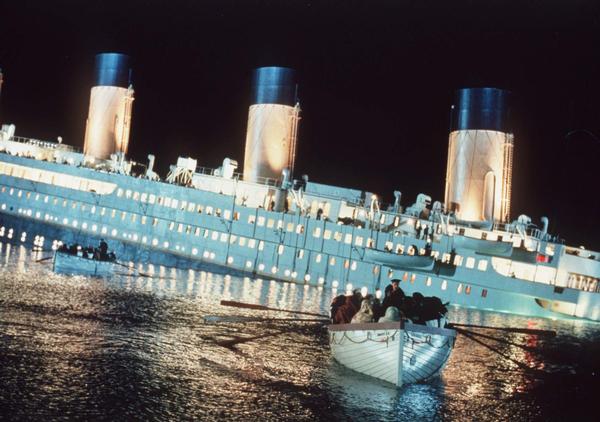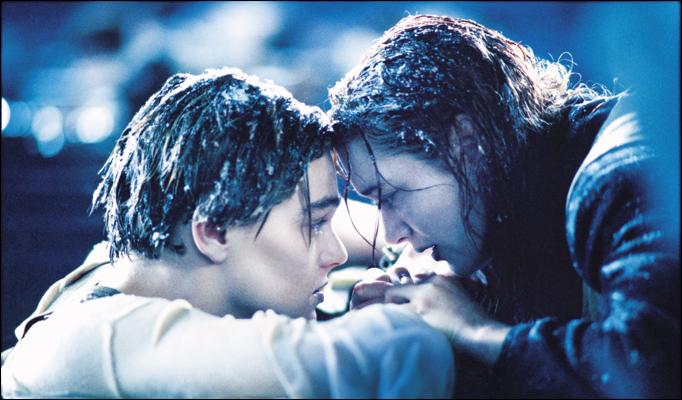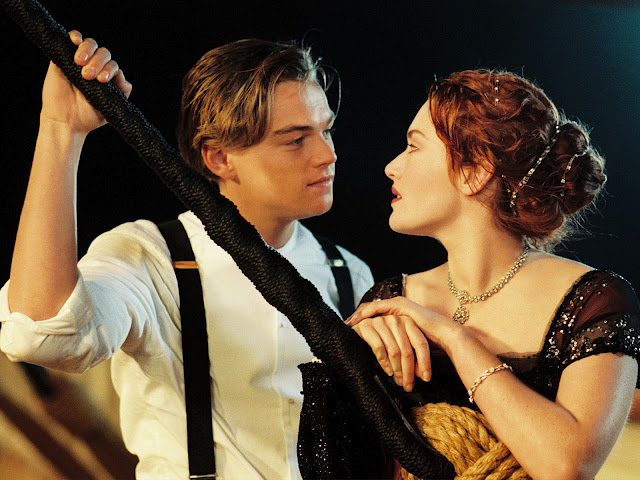|
Titanic (3D)
Reviewed
by
Damien Straker on
March 30th, 2012
Fox presents
a film directed by
James
Cameron
Screenplay
by
James Cameron
Starring:
Leonardo
DiCaprio, Kate Winslet, Billy Zane, Frances
Fisher,
Gloria Stuart, Bill Paxton, Kathy Bates and Victor Garber
Running
Time:
194 mins
Rating:
M
Released: April 5th,
2012
|
9/10
|
|
To commemorate the one hundred year anniversary
of the sinking of the RMS Titanic in 1912, director James Cameron is
rereleasing his blockbuster film in 3D. The film begins in modern times
when a
group of treasure hunters, including Brock Lovett (Bill Paxton), are
using
technology to try and extract objects from the wreckage of the Titanic.
Luck
stumbles upon them when they are contacted by an elderly woman named
Rose (Gloria
Stuart) who says she is the woman in one of the drawings they found.
When they
ask her about the whereabouts of a diamond called the 'Heart of the
Ocean', she
recalls her time on the ship to them. Boarding the Titanic as a young
woman,
Rose (Kate Winslet) feels smothered by her family, including her
dogmatic
fiancé Cal (Billy Zane) and her mother Ruth (Frances Fisher). Staying
on the
lower decks is Jack (Leonardo DiCaprio), an artist who won his ticket
in a
poker game. One night Jack saves Rose from throwing herself off the
back of the
ship and they start to fall in love with each other. Their affair is
disrupted
by Cal and his bodyguard and the collapse of the ship after it strikes
the
iceberg.

How did he do it? When James Cameron's film was
first released in 1997 it was regarded as one of the most lavish and
expensive
films of all time. Yet despite winning a record number of awards its
reputation
as a great American film has been tarnished. Titanic's
most iconic moments have been imitated and mindlessly parodied
so frequently that it is easy to forget that the film is not only a
great love
story but also one deeply critical of capitalism, self-interest and
ambition.
Watching the film today and it has not aged in the slightest. There are
sequences so extraordinary that they continue to defy our comprehension
for
what is possible in modern cinema. Yet this is in no part thanks to the
superfluous 3D conversion. Unlike Cameron's Avatar
(2009), this film was not shot for 3D, which means that there are very
few
scenes that standout as being significantly enhanced. The limited use
of 3D
means that it is easy to be cynical about Cameron rereleasing the film
as a
cash grab, rather than a tribute to the century marking the ship's
collapse. However,
Titanic warrants another viewing, not
only because it is spectacular on the big screen but also because the
film's
powerful moral core has been sustained, elevating it above the
conventions of
its love story and into a timeless critique of human indecency. The film
documents how there were so few lifeboats available on the Titanic that
only
half the ship's passengers could be saved because there was little
thought of aiding
the lower-class decks. Watching the film again after the GFC, where the
wealthy
showed equally little compassion and it is apparent that nothing
between 1912
and 2012 has changed. The way the film damns the wealthy upper-class,
harking
back to the Capra-era of filmmaking, means that Cameron could quite
rightly be
accused of being hypocritical. He is a director deeply embedded in the
Hollywood system and has made two of the highest grossing films of all
time,
one of which is Titanic itself. Yet
when people rewatch this film they will be reminded of just how much
anger and
guilt Cameron shares between himself and the screen.

Consider for example the way that Cameron has
chosen to frame the narrative to project his own self-refection. Brock
and his
team are treasure hunters, who initially seem only interested in the
valuables
and the technology, exploiting the ruins of the vessel. When he
demonstrates
the dismantling of the ship on the computer one of the men says to
Rose:
"Pretty cool huh?" Yet by the end of the film Brock and his crew are
unexpectedly moved by Rose's story because they have a greater sense
firsthand
of what a terrible experience this was for her. Assumedly, this is a
mirror of
Cameron's own experiences in researching and creating this film,
appreciating
it as far more than just a commodity. Overcoming blind idealism is
therefore one
of the film's central themes and is visualised spectacularly through
Cameron's
sophisticated formalism. Before stepping onto the ship, the low angle
shots
looking up at the Titanic heighten its grandeur. This is to show how
people
foolishly believed that it was indestructible because of its size and
its power.
The fluency of the camera as it sweeps across the decks is also
significant
because it leads one into a false sense of liberty, believing that
there is
great freedom and spatiality to be found onboard. This is contrasted
with the
interior rooms, where cabins, dining rooms and corridors are tightly
framed and
shot. The delicacy and elegance of the camera movement on the upper
decks is
used to show how controlled and suppressed Rose's life is as a woman.
Her
mother even mentions that she doesn't need to go to university because
she is
already engaged. There is also a clever moment where slow motion is
briefly
employed to further show the contained, mechanical nature of her
upper-class
lifestyle. Smartly, Cameron's best films have subverted the female
role, where
women exude more masculine qualities over the course of the narrative.
It's
visible in Aliens (1986), the Terminator
films and here too. As Rose
defies her family's orders the formal elements change, like in a scene
where
she is dancing on the lower decks with Jack. The rapid panning of the
camera
asserts her freedom and her independence, which she will later use for
her own
survival.

As pure entertainment, the first two hours of
the film are close to perfection. My favourite moments are shared
between the
scenes at dinner, the exterior shots and those extraordinary early
moments
where Cameron films the actual wreckage of the Titanic. Fulfilling many
of
these classic scenes are touches of wit and humour and two charismatic,
star-making performances from DiCaprio and Winslet, both of whom have
gone on to
have distinguished careers. It is surprising that Billy Zane never had
bigger
opportunities because he makes his character so deliciously wicked. Cal
is a
man who lives solely through money. Everything can be bought for him,
except
love. The other side characters are well cast with actors who give
their small
roles noticeable weight too. The most poignant is the ship's architect
Thomas
Andrews (Victor Garber). There's a chilling scene where he is reduced
to a
zombie, watching a clock as his dream collapses around him, weighed
down by
helplessness and guilt for designing the ship. Frances Fisher as Rose's
mother is also fascinating because although her
character postures as being wealthy, and excludes others for not being
in the
same league, she is aware of own family's struggling financial
situation and is
determined to force her daughter to marry into wealth to save herself.
Although
Cameron retains a masterful grip on the action, the film falters
marginally as
the ship begins to collapse. The scenes of Rose running down long white
corridors are so isolating they could be straight from a horror movie.
But
these sequences could have been leaner and there are contrivances that
see the
narrative veer unnecessarily close to melodrama. Did Rose really need
to jump
back onboard the ship? The film recovers strongly because the final
moments alone
in the cold black water are deeply moving. With nothing to save these
people,
the sense of loss and despair is palpable and haunting. The film
favours moral
complexity over simplistic emotions of physical suffering too. Cameron
unflinchingly
shows us the cowardice, the arrogance and self-interest of people who
opt only
to save themselves, while the others are left to freeze to death in the
icy
water. Thus, although the 3D is underused and underwhelming, this might
be the
last chance to see this terrific film on the big screen again. Other
than being
visually stunning, it is compulsive viewing because of its intelligence
and
willingness to explore class, ambition and gender politics. However
Cameron did
it, this is a great American blockbuster.
|